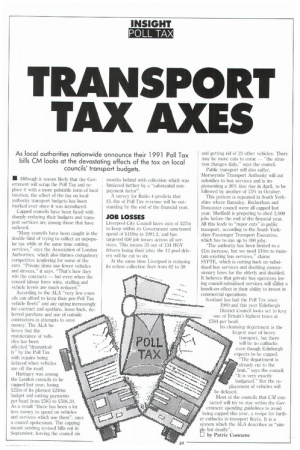TRANSPORT TAX AXES
Page 33

If you've noticed an error in this article please click here to report it so we can fix it.
• Although it seems likely that the Government will scrap the Poll Tax and replace it with a more palatable form of local taxation, the effect of the tax on local authority transport budgets has been marked ever since it was introduced.
Capped councils have been faced with sharply reducing their budgets and transport services are among those that have suffered.
"Many councils have been caught in the double bind of trying to collect an unpopular tax while at the same time cutting, services," says the Association of London Authorities, which also blames compulsory competitive tendering for some of the cuts. "Private firms use fewer vehicles and drivers," it says. "That's how they win the contracts — but even when the council labour force wins, staffing and vehicle levels are much reduced."
According to the ALA "very few councils can afford to keep their pre-Poll Tax vehicle fleets" and are opting increasingly for contract and spothire, lease back, deferred purchase and use of outside contractors in attempts to save money. The ALA believes that the maintenance of vehicles has been affected "dramatically" by the Poll Tax with repairs being delayed when vehicles are off the road.
Haringey was among the London councils to be capped last year, losing
,E22m of its planned £240m budget and cutting payments per head from £583 to £508.34. As a result "there has been a lot less money to spend on vehicles and services which use them", says a council spokesman. The capping meant sending revised bills out in September, leaving the council six
months behind with collection which was hindered further by a "substantial nonpayment factor".
A survey for Radio 4 predicts that E1.4bn of Poll Tax revenue will be outstanding by the end of the financial year.
Liverpool City Council faces cuts of ,U7m to keep within its Government sanctioned spend of E419m in 1991/2, and has targeted 650 job losses across all services. This means 33 out of 134 FIGV drivers losing their jobs; the 12 pool drivers will be cut to six.
At the same time Liverpool is reducing its refuse collection fleet from 82 to 59 and getting rid of 22 other vehicles. There may be more cuts to come — "the situation changes daily," says the council.
Public transport will also suffer. Merseyside Transport Authority will cut subsidies to bus services and is implementing a 20% fare rise in April, to he followed by another of 15% in October.
This pattern is repeated in South Yorkshire where Barnsley. Rotherham and Doncaster council were all capped last year. Sheffield is preparing to shed 2,000 jobs before the end of the financial year. All this leads to "major cuts" in public transport, according to the South Yorkshire Passenger Transport Executive, which has to axe up to 400 jobs.
"The authority has been limited to a Elm increase, but we need 210m to maintain existing bus services," claims SYPTE, which is cutting back on subsidised bus services and doubling concessionary fares for the elderly and disabled. It believes that private bus operators losing council-subsidised services will stiffer a knock-on effect in their ability to invest in commercial operations.
Scotland has had the Poll Tax since 1989 and this year Edinburgh District Council looks set to levy (me of Britain's highest taxes at .c.:584 per head.
Its cleansing department is the largest user of heavy transport, but there
will be no cutbacks even though Edinburgh expects to be capped. "The department is already cut to the limit," says the council. It is very exactly budgeted." But the replacement of vehicles will be delayed.
Most of the councils that CM contacted will try to stay within the Government spending guidelines to avoid being capped this year, a recipe for further cutbacks in transport fleets, it is a system which the ALA describes as "simple but deadly".
LJ by Patric Cunnane




















































































